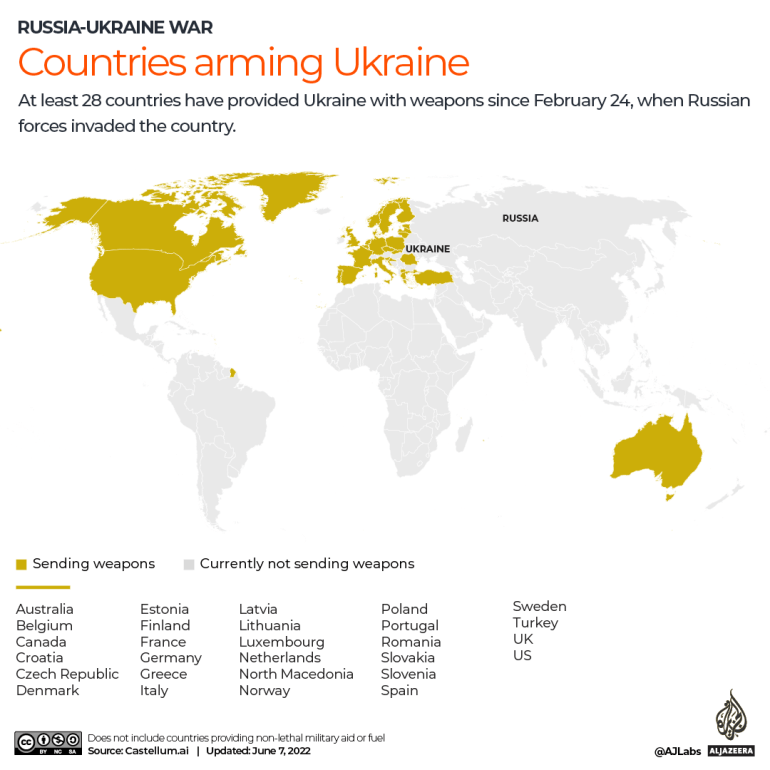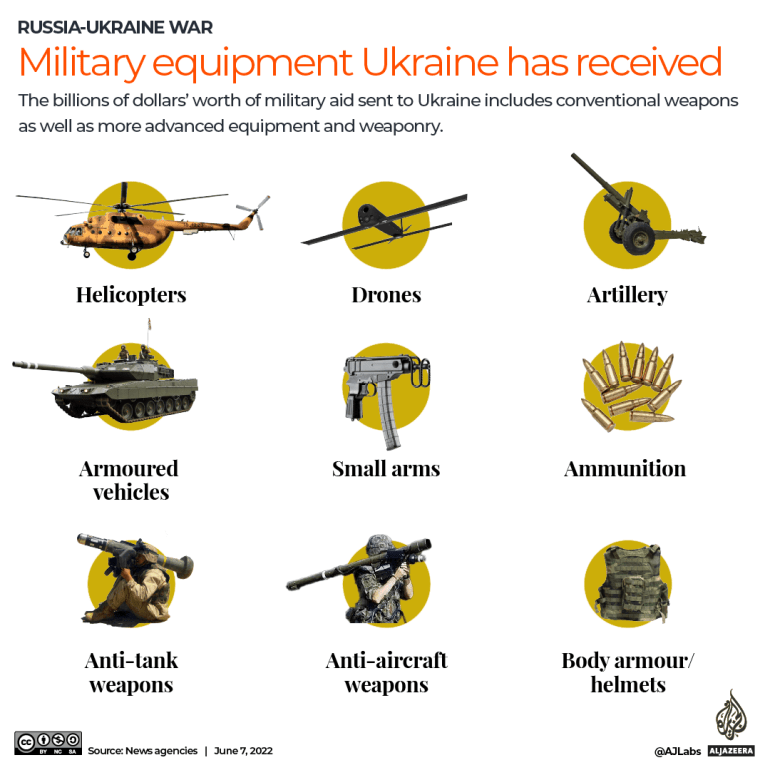NATO chief says alliance will not back down on Ukraine aid
NATO Secretary General calls on member states to pledge more aid for Kyiv during winter amid relentless Russian attacks.

NATO Secretary-General Jens Stoltenberg has accused Russia of “trying to use winter as a weapon of war” as he called on member states to pledge more aid for Ukraine amid Moscow’s relentless attacks on the country’s power infrastructure.
Russian attacks on Ukrainian infrastructure have left millions of people without power, heat and water as winter temperatures have plummeted to below zero.
Keep reading
list of 4 itemsRussia-Ukraine war: List of key events, day 277
Ukraine’s Kyiv mayor rebuffs Zelenskyy criticism amid energy woes
Zelenskyy warns of more Russian missile attacks on Ukraine
In a statement on Tuesday, NATO ministers meeting in the Romanian capital, Bucharest, condemned Russia’s “persistent and unconscionable attacks on Ukrainian civilian and energy infrastructure” and confirmed a 2008 decision that Ukraine will eventually join the alliance.
“NATO’s door is open,” Stoltenberg said, as allies promised more arms for Kyiv and equipment to help restore power and heat.
“Russia does not have a veto” on countries joining, Stoltenberg said.
Ukraine’s Foreign Minister Dmytro Kuleba called for an immediate supply of weapons, especially advanced air defence systems, to come “faster, faster, faster” as he joined the two-day meeting of NATO foreign ministers.
“When we have transformers and generators, we can restore our system, our energy grid, and provide people with decent living conditions,” Kuleba said.
NATO foreign ministers are focused on ramping up military assistance for the war-torn nation, such as air-defence systems and ammunition.
Diplomats have acknowledged supply and capacity issues, however, as they also discuss non-lethal aid.
Part of this non-lethal aid – goods such as fuel, medical supplies, winter equipment and drone jammers – has been delivered through a NATO assistance package allies can contribute to and which Stoltenberg aims to increase.
“NATO will continue to stand for Ukraine as long as it takes. We will not back down,” Stoltenberg said in a speech in Bucharest.
He added that the only way to get the right terms for a negotiation to begin would be for Ukraine to advance on the battlefield.
Stoltenberg’s comments were echoed by several ministers from the 30-member alliance, who were also joined by Finland and Sweden as they look to secure full membership pending Turkish and Hungarian ratifications.
“The coming months will be a big test for us all. For Ukraine, it is existential, for us moral. We must continue helping Ukraine for as long as necessary,” Slovak Foreign Minister Rastislav Kacer said.
Former United States Ambassador to NATO Robert Hunter said steps could have been taken to counter the destruction Russia was doing in Ukraine instead of just repairing the damage.
“It’s surprising that the alliance led by the US has not done more so far in terms of anti-drone and anti-missile defences,” Hunter told Al Jazeera from Washington, DC.
Al Jazeera’s Andrew Simmons, reporting from Bucharest, said that while Stoltenberg is promising a wide range of measures to support Ukraine, this is still “an alliance of 30 states in which consensus is the rule.
“Not all the states agree that military aid should be given to Ukraine so you have coalitions of the willing, so to speak,” Simmons said.
“There will be pledges of non-lethal aid by NATO itself, but there will also be pledges of actual military aid by individual states. The major issue right now is the winterisation of this war, the use of the cold as a weapon by Russia, targeted attacks on infrastructure in the country, and blackouts all across Ukraine.”
Bottom of Form
President Volodymyr Zelenskyy has warned Ukrainians of new Russian attacks this week that could be as bad as those last week, which left millions of people with no heat, water or power.
Russia acknowledges attacking Ukrainian infrastructure. It denies its intent is to hurt civilians.
“It is going to be a terrible winter for Ukraine, so we are working to strengthen our support for it to be resilient,” a senior European diplomat said.

Germany, which holds the G7 presidency, also scheduled a meeting of the Group of Seven rich nations with some partners on the sidelines of the NATO talks, as it presses for ways to speed up reconstruction of Ukraine’s energy infrastructure.
Germany also announced on Tuesday it will be providing Ukraine with more than 350 generators as well as financial assistance to repair energy infrastructure worth 56 million euros ($58m).
Washington is working with US firms and European nations to locate equipment that can help restore high-voltage transmission stations damaged by Russian missile attacks, a senior State Department official told reporters.
The official did not specify what form the assistance would take or how much it would be worth.
France is also planning to send generators to Ukraine to help stabilise the electricity grid while the country’s President Emmanuel Macron heads to Washington, DC for the first state visit of Joe Biden’s presidency this week.
Included in the long agenda for their Thursday meeting at the White House is Russia’s war in Ukraine, as both Biden and Macron work to maintain economic and military support for Kyiv.
“The reason Russia is continuing these war crimes is because it is losing ground,” a French official said, referring to the attacks on civilian infrastructure.
Simmons said “there is a desperate need for better air defence systems.
“There is a whole range of weaponry available, but there is resistance by some states about deploying them within Ukraine, and that is a major issue that is going to be discussed over the next 48 hours.”
Highlighting the view from Baltic states, which have been at the forefront of the support for Kyiv, Lithuanian Foreign Minister Gabrielius Landsbergis urged the alliance to press ahead with deliveries.
“My message to fellow foreign ministers at today’s NATO meeting is simple: Keep calm and give tanks,” he said on Twitter, showing an image of a Ukrainian flag with a tank in the middle.
Ministers will also discuss Ukraine’s application for NATO membership. However, leaders have stopped short of taking any concrete steps such as giving Ukraine a membership action plan that would lay out a timetable for bringing it closer to NATO.
Georgia, Moldova and Bosnia and Herzegovina will also attend the meeting on Wednesday as NATO looks to boost ties with the countries amid fears Russia is seeking to destabilise states beyond Ukraine.
